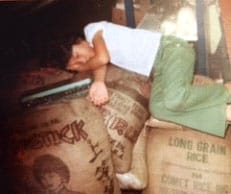On a beautiful morning, as I was walking, hand-in-hand with my four-year old, Rae, she looked up at me and asked, “Mommy, anything I want to be, will I be it?”
I stopped in my tracks and said, “yes, you can sweetheart” and then proceeded in a very enthusiastic manner to tell her all of the things she could be – “you can be a lawyer, a doctor, a teacher, the President of the United States! Anything in the world you want to be, you can!” Thankfully, we were outside, because I was animated and gesturing up to the blue skies to emphasize that the world is hers.
I didn’t mention fish cleaner, or crab picker or laborer in my list of professions that she could pursue that day – not that there’s anything wrong with these jobs. But as my dad told me growing, up, “you need to go to school and study hard so you don’t have to clean fish like me all day, so you don’t have to work like me.”
And working like my dad and mom meant putting in 14-hour days, 364 ½ days a year, at our ethnic grocery store and fish market – Mendoza’s International – and still finding it hard to keep up with the bills and taxes. Struggling. Surviving. My parents, Filipino immigrants, did not want that for their three children.
This is the same sentiment I hear from my clients. That’s why they’re here, living in the U.S. with no documentation. That their struggles, their survival in the U.S. will lead to a different, better life for their own children.
It sounds cliché, I know, especially to the many people who are tired of the immigration debate, to those who want something done right now to deport those who are living here without documentation. But it is a meaningful idea and one that will never, ever go away so long as we have mothers and fathers with their deep desires to protect and provide for their children.

The picture I’ve included is one of me taking a nap on bags of rice we sold at our store. The grocery store was very much home for me and my family. After school, it’s where I went every single day. As a kid, I wanted to play outside and have a “normal” life. Today, my husband and I have provided that for our kids. Nothing makes me happier than to see them laughing and playing with their friends. When they were younger, my kids took naps on the warm sand at the beach steps from our home; we take family vacations, and they are living the dream (even though they may not know it yet).
So, it worked. My immigrant parents’ push to work hard in school and their daily struggles and surviving for us, led in large part to this life I’m living now.
This circle will never end and when our politicians talk about immigration reform and stopping illegal immigration, it’s one of the most important things for them to recognize.